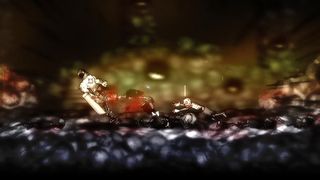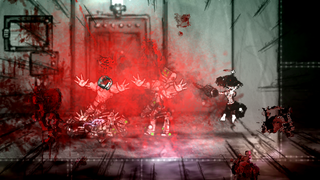Everybody has a favorite game. That one game they love beyond all reason--that one game they give to their buddies when they’ve finished, saying “You have to play this.” The one we wish we could share with the whole world--but what happens when you have to break a few rules to do it?
For the love of the game
Vincent Barabus likes solving puzzles, and his favorite puzzles involve reverse engineering software. He taught himself to code, but was never particularly interested in writing his own programs. He always preferred puzzling out other peoples’ code instead, picking it apart to see how it works. He also likes playing games, especially beat ‘em ups and slashers. One game that stuck with him longer than most was The Dishwasher: Vampire Smile.

When asked what about Vampire Smile caught his fancy, Barabus was quick to point out its fast-paced action and unique visual style “It doesn’t have an analog on any other system!” For all his admiration, Barabus wished more people could play it. First released onto the Xbox Live Arcade in 2011, Vampire Smile had languished within Microsoft’s walled garden for over two years. Most people would have shaken their heads and lamented that others wouldn’t get to play such a good game--but not Barabus. Instead he took it upon himself to solve a new and challenging puzzle: to create his own PC port of Ska Studio’s gruesome hack ‘n slash. And that’s exactly what he did; his port was released to the Internet on May 31, 2013.
The English-speaking Internet learned of the release through Indie Statik’s Chris Priestman, and the story quickly spread. The port was well received in Barabus’s native Russia, but the rest of the gaming Internet quickly vilified the port and the creation as piracy. Barabus replied directly to the accusations, claiming that all he had done was make Vampire Smile available to a population that had never even had the opportunity to purchase it. Speaking with GamesRadar in early July, Barabus maintained that he had not “pirated” Vampire Smile but merely “ported” it for the non-Xbox-owning community. “Yes, I violated the license agreement,” he said. “Yes, maybe I violated the law--but I'm not a pirate.”
James and Michelle Silva, the pair behind Vampire Smile, don’t see the distinction as clearly. “Making it run on the PC is a port,”said James, “but putting that port up on the Internet is piracy.” Both members of Ska Studios expressed admiration of Barabus’s technical skill, but admitted that they were “weirded out” by his assertions of morality. The pair were remarkably level-headed during the whole affair. According to James, they understood that a pirated version was bound to happen sooner or later. “I obviously don’t endorse it,” James said, “but I know it happens.” Michelle agreed with her husband’s easy-going attitude. “There’s only so many ways you can really respond. If you respond ‘RAWR WE’LL TAKE LEGAL ACTION’ it kind of makes you look like a jerk.”

For what it’s worth, Barabus’s admiration of Vampire Smile seemed genuine. When one hears the words “software pirate,” one usually thinks of warez groups like Razor 1911, RELOADED, or SKIDROW--names you see between “Crack” and the title of a new release on a torrent aggregator. While these groups rarely give any information about their motivations, the sheer volume of their output suggests they don’t crack games because they love them. In contrast, Barabus worked to get a single game running because he wanted to share it with the world--a fairly noble intention. But then, we all know about good intentions, don’t we?
The road to Hell
There were two fundamental assumptions that Barabus had to make to justify creating the PC version of Vampire Smile. The first was that porting the Xbox Live game to PC would be simple for Ska. “They can assemble the game for the PC by switching several options in Visual Studio and by making some minor changes in the game code,” explained Barabus, “They don’t need my help.”
James isn’t impressed by the idea that “you just flick a switch and it’s on PC.” Merely updating Vampire Smile from XNA 3.0 to 4.0 caused more than 300 different errors and halved the frame-rate. “A lot of it comes down to me being a sloppy programmer,” James admitted, describing how his sloppy programming made it difficult to change Vampire Smile’s resolution. Vampire Smile is locked at 720p because that was the resolution he’d chosen to use for the Xbox 360 release--he hadn’t accounted for the higher resolutions found on PC monitors. James explained that he’d like to add those options before release, stressing that these fixes take time for a two-person team. “If it was a simple switch, that’d be great--but it’s not.”

The second assumption Barabus had to make was this: because Vampire Smile had not yet been ported, it would never be ported. This assumption feeds off the first; if the port was just “flicking a switch,” what prevented Ska from just getting it over with? For Barabus the answer was obvious: Microsoft. Barabus was convinced that the Redwood giant was blocking Vampire Smile’s PC port. It makes sense, right? Microsoft wants exclusives to drive sales of its expensive console--highly regarded indie action games might get a potential buyer over the hump, but if you allow that exclusivity to expire, Microsoft loses its edge. The two years of silence from Redwood only strengthened his conviction that Microsoft had no plans to release a PC port.
How much of a part did Microsoft actually play in delaying the PC port of Vampire Smile? James declined any specific answer, but pointed at Microsoft Studio’s willingness to port other XBLA games like Dust: An Elysian Tale. Both could say that they’d been talking with Microsoft about creating a PC version of the entire Dishwasher series before Barabus released his version.
Why had there been such a long silence on the matter? Michelle pointed out that it’s standard practice in the industry to play one’s cards close to the chest. According to James, the pair was aware of the people clamoring for a Steam release, but they were more concerned with finishing their next game, Charlie Murder. “Anyways,” he added, “who announces a PC port right before their next XBLA game comes out?”
Moving Forward
Ska Studios and Microsoft announced an official port for Vampire Smile within days of Barabus’s port going to the web. Barabus, who hadn’t expected a reaction so quickly, pulled down his unofficial port and told users to wait for the real deal. Unfortunately, that remains little more than a symbolic gesture--a torrent of what is almost certainly Barabus’s port is alive and well on the Pirate Bay.
Torrents aside, Barabus doesn't believe his port will result in fewer sales of the official version. He readily admits that his own port had significant flaws--he never got it to work with AMD machines, nor did he ever get the shaders right. However, he dropped all plans to finish the project when Ska announced the official port. “Now that the game is officially announced, people will have to wait for it,” he said. “I hope my PR helped!”

It actually did help, according to Ska Studios. Both James and Michele gave at least some credit to Barabus for ensuring that Vampire Smile will be ported. “Him doing that kind of pushed it,” James admitted. While both were confident that the port would have been made regardless of outside pressure, the pair admitted that Barabus’s port changed the tempo of the project. “It definitely made Microsoft interested,” said Michelle. “They thought, ‘Huh, there’s a lot of interest in this.’”
When asked how they planned to encourage players to pick up the official port instead of the pirated version, the pair answered in unison: quality. “A lot of stuff got really fuzzy toward the end, so we’re going to uprez everything,” James elaborated. “We want to see how nuts we can go with effects. You know PC, you can choose between lots of particles...or an insane amount of particles. I’m curious to see how much blood we fit in.” Michelle added that there would be new boss fights before quickly hedging with a guarded “...maybe.”
